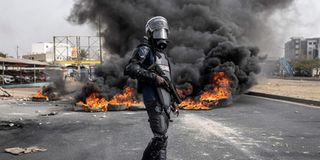What we know: Senegal violence

Sonko was forcibly returned to Dakar ahead of the ruling, triggering protests by his supporters.
Violence erupted in Senegal on Thursday, killing nine people in one of the deadliest flare-ups of political unrest in recent years, after opposition politician Ousmane Sonko was sentenced to two years in prison.
Nation.Africa explains the situation and answers key questions about the tense political situation.
What led to the violence?
Firebrand opposition politician Sonko was accused by a young beauty salon employee of raping her on five occasions.
Sonko, 48, has always denied wrongdoing and claims the government has prosecuted the case to block him from contesting the 2024 presidential election.
On Thursday, he was acquitted of the rape charges but sentenced to two years' imprisonment for inciting a young person under the age of 21 into "debauchery" -- a lesser offence than rape, which was criminalised in 2020.
Under Senegal's electoral law, it appears that the conviction renders him ineligible to run.
Sonko says he is seeking to avoid the same fate as two of President Macky Sall's other rivals, Khalifa Sall and Karim Wade, whose careers were cut short by legal cases and barred from running.
Sonko is divisive, but enjoys popular support among young people.
Sonko, who did not attend his trial, was on Sunday forcibly taken to his home in Dakar, where he claims he is being illegally held.
He has called on the Senegalese people to demonstrate "en masse".
Is it all over for Sonko?
The PASTEF-Patriots party leader has not spoken since his conviction.
Access to his home is blocked by security forces, who are barring anyone who tries to approach.
His lawyers and supporters have argued he is under illegal house arrest.
The Minister of Justice, Ismaila Madior Fall, denied that Sonko was being detained.
He said it was an "administrative police" measure for "limiting his movements" because of "his calls for insurrection".
The minister added that the sentence must be carried out and that Sonko "could be arrested at any time".
Many Senegalese fear the possible consequences of an arrest.
The minister said that Sonko could not appeal against the court's decision because he was not present at the trial and had been tried in absentia.
Cire Cledor Ly, one of Sonko's lawyers, disputed that claiming that because the case had been reclassified to a lesser offence, Sonko could no longer be considered to have missed the trial.
Legal experts say that under the law, Sonko must be retried if he is taken into custody or arrested.
Even if his fate were to be sealed in court, it is still possible that there could be a political settlement to calm tensions, through an amnesty, for example.
What comes next?
Armed men in fatigues were deployed at various points in the capital on Friday though AFP was unable to identify which branch of the security forces they represented.
The situation remained tense and seemed likely to flare up again as of late Friday.
Sonko's situation is not the only source of tension in the country.
Voters have been waiting for months to find out whether President Sall, who was elected in 2012 and re-elected in 2019, will stand for a third term in 2024.
The opposition and rights activists say that the constitution prohibits him from doing so and are calling on him to step down.
The constitution, which was revised in 2016, says that the presidential term of office is five years, rather than seven, and that "no one may serve more than two consecutive terms".
Sall has said on several occasions in the past that he would not serve more than two terms.
But for months now he has remained vague on the subject.
"Legally speaking, the debate has been settled for a long time," he said in a magazine interview in March.
"Now, should I run for a third term or not? It's a political debate, I admit it."
To ease tensions, Sall on Tuesday launched a political dialogue, boycotted by some members of the opposition, at which the prospect of a third term will be discussed.





